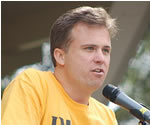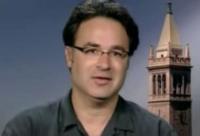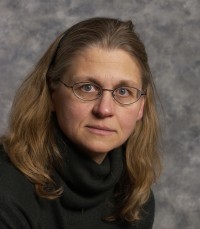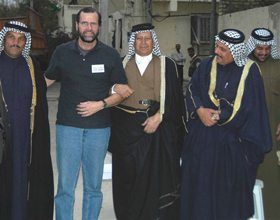every life matters... Advisors
Salam Talib 
Salam Talib is a journalist and computer engineer from Iraq who is currently attending graduate school in Berkeley. Independently and in collaboration with other freelance journalists, he has filed hundreds of stories with Free Speech Radio about the situation on the ground in Iraq. His writings have been featured in The Nation, Common Dreams, and Antiwar.com. Since the most recent invasion of Iraq began, Salam has also been active designing databases for numerous NGOs which work with disabled Iraqis, and he recently worked to build a wheelchair factory in Iraq, with an NGO cooperating with Whirlwind Wheelchair of San Francisco State University to help disabled Iraqis.
In brief, Salam describes his experience living in Iraq:
"In Saddam's time, in 1998, I committed a crime, which is I gave everybody Internet for free—I hacked into the system. And I did that, and Saddam people got very angry. After a long story, I had to flee the country. I went from Baghdad, I went to north Iraq, which is the only safer place you can go without a passport. In 2003, the war happened, and I had no job as a computer engineer, so what I did, I worked as a translator for the journalists, because I spoke a little bit of English at the time. And then I become a journalist myself when the lack of journalists happened in Iraq, when it was too dangerous for them to come. So I was doing it myself. Then I have a directed threat and I was shot at, and my friend was killed instead of me. So I had to leave Iraq, and now I'm in the US."
David Swanson 
David Swanson is the author of the upcoming book "Daybreak: Undoing the Imperial Presidency and Forming a More Perfect Union" by Seven Stories Press and of the introduction to "The 35 Articles of Impeachment and the Case for Prosecuting George W. Bush" published by Feral House and available at Amazon.com. Swanson holds a master's degree in philosophy from the University of Virginia. He has worked as a newspaper reporter and as a communications director, with jobs including press secretary for Dennis Kucinich's 2004 presidential campaign, media coordinator for the International Labor Communications Association, and three years as communications coordinator for ACORN, the Association of Community Organizations for Reform Now. Swanson is Co-Founder of AfterDowningStreet.org, creator of ConvictBushCheney.org and Washington Director of Democrats.com, a board member of Progressive Democrats of America, the Backbone Campaign, and Voters for Peace, a member of the legislative working group of United for Peace and Justice, and convener of the accountability and prosecution working group of United for Peace and Justice.
Dahr Jamail 
When the invasion began, Jamail, a fourth-generation Lebanese American who grew up in Houston, decided he could sit at home, depressed and angry, or he could take action. He bought a laptop computer, a digital camera, and a plane ticket.
In Iraq for eight months between November 2003 and February 2005, Jamail reported "collateral damage" far beyond what the military or embedded journalists acknowledged. He wrote of soldiers shooting people in prayer at a Baghdad mosque. He relayed accounts of civilians in Fallujah with extraordinary burns (later revealed to be caused by white phosphorus) and of men and women who bore white flags being shot in the Euphrates River as they tried to swim to safety. Jamail also watched those profiting from the war, reporting examples of blurred lines between the military and corporations operating in Iraq, as well as Bechtel's failure to restore potable water after being paid hundreds of millions to do so.
Unrelated sources corroborated the stories Jamail heard. "So either it's a city-wide, conspiratorial lie, or it's the truth," he says. Acknowledging his reliance on interpreters, Jamail says, "I trust them. They put their lives on the line to even be seen with me, in an effort to get the truth out."
After starting with a homemade press pass and no outlet but e-mail, Jamail created a web site, dahrjamailiraq.com, and began writing for the Inter Press Service, The Asia Times, and The Nation, among others. He also reports for Democracy Now! and the BBC. At the culminating session of the World Tribunal on Iraq in June 2005, he documented U.S. violations of Fourth Geneva Convention provisions for health care in occupied countries.
By autumn 2005, Jamail's interpreters said it was too dangerous for them to help him to return to Iraq. His articles and e-mail dispatches continued, blending information from his phone calls and e-mail with that culled in hours of reading Arab and other foreign media. He also tours as a speaker, sharing details of the occupation's immorality. "It's not about defense," Jamail says. "It's about money, and that, to me, is the greatest travesty of all."
"Beyond The Green Zone: Dispatches from an Unembedded Journalist in Occupied Iraq" was published by Haymarket Books in 2007.
Coleen Rowley 
In May of 2002 Rowley brought some of the pre 9-11 lapses to light and testified to the Senate Judiciary Committee about some of the endemic problems facing the FBI and the intelligence community. Rowley's 12 page memo to FBI Director Robert Mueller in connection with the Joint Intelligence Committee's Inquiry led to a two year long Department of Justice Inspector General investigation. She was one of three whistleblowers chosen as persons of the year by TIME magazine.
In April 2003, following an unsuccessful and highly criticized attempt to warn the Director and other administration officials about the dangers of launching the invasion of Iraq, Rowley stepped down from her legal position to go back to being an FBI Special Agent. She retired from the FBI at the end of 2004 and now speaks publicly to various groups, ranging from school children to business/professional/civic groups, on two different topics: ethical decision-making and "balancing civil liberties with the need for effective investigation."
Rowley continues to write and speak out about the numerous other mistakes made in the so-called "war on terror". Minnesota congresspersons and senators twice nominated Rowley to serve on the Privacy and Civil Liberties Oversight Board, the creation of which was recommended by the of the 9-11 Commission, but she was not selected by the Bush Administration. She ran—unsuccessfully—for Congress in 2006.
Ms. Rowley continues to volunteer her time as a peace and justice activist, promoting peaceful, truthful actions.
Ret. Colonel, Diplomat, Ann Wright 
"I have served my country for almost thirty years in some of the most isolated and dangerous parts of the world. I want to continue to serve America. However, I do not believe in the policies of this (Bush) Administration and cannot --- morally and professionally --- defend or implement them. It is with heavy heart that I must end my service to America and therefore resign."
Patriotism can manifest in many forms, and has for Ann Wright. She has been a career military woman, a State Department diplomat, and for the past few years an influential spokesperson in the anti-war movement. Ann Wright grew up in Bentonville, Arkansas, and attended the University of Arkansas, where she holds a Master's and a Law Degree. She also has a Master's Degree in National Security Affairs from the US Naval War College.
Ann was on active duty with the U.S. Army for 13 years, and in the Army Reserves for another 16 years, retiring as a Colonel. Ironically, part of her work was in the Army's civil affairs units, which were charged with developing plans for U.S. military interventions, as she explained, "plans about how you interact with the civilian population, how you protect the facilities – sewage, water, electrical grids, libraries…It's our obligation under the law of land warfare." Ann requested a release from active duty from the Army in 1987 and joined the State Department. For the next 16 years, she served as a foreign diplomat in countries such as Nicaragua, Somalia, Uzbekistan, Kyrgystan, Sierra Leone, Micronesia and Mongolia. She was on the team that reopened the US Embassy in Kabul, Afghanistan in December, 2001, after the fall of the Taliban to US forces.
In all those years, Ann Wright was proud of her representation of America. However, on March 13, 2003, the eve of the US invasion of Iraq, Col.. Ann Wright sent a letter of resignation to then Secretary of State Colin Powell. She felt that without the authorization of the UN Security Council, the US invasion and occupation of a Moslem, Arab oil-rich country would be a illegal. Only two other Federal government officials resigned over the Bush admininistration's decision to invade and occupy Iraq. In an interview, Ann explained that, in Foreign Service, "Your job is to implement the policies of an administration…if you strongly disagree with any administration's policies, and wish to dissent publicly from those policies, your only option is to resign. I understood that and that's one of the reasons I resigned – to give myself the freedom to speak out."
Mary Zerkel
Mary Zerkel is the National Coordinator of the Eyes Wide Open/Cost of War Project, and the Peacebuilding Program Director, at the Chicago office of the American Friends Service Committee. Mary organized the Eyes Wide Open Exhibits, through AFSC. Last fall, coordinators displayed the exhibits across 48 states, keeping the war in Iraq in the public eye in a time when the financial bailout and the election were grabbing headlines.
"We organized a conference call briefing on Iran with speakers Debra Dillard and Lynn Gottlieb on their recent travels to Iran, and pulled together a small group to work with the Iraq program on issues critical to Iraqi refugees…"
Impeccable organizing went into the displays viewed nationwide. This work inspired us, and Ms Zerkel's questions helped focus all aspects of the display and outreach.
Michael McPhearson, Veterans for Peace 
Michael T. McPhearson, a native of Fayetteville North Carolina was a field artillery officer in the 24th Mechanized Infantry Division during Desert Shield/Desert Storm, also known as Gulf War I. Michael joined the Army Reserve 1981 as an enlisted soldier at the age of 17 and attended basic training the summer between his junior and senior high school years. His military career includes 6 years of reserve service and 5 years active duty service. He separated from active duty in 1992 as a Captain.
Now living in Saint Louis Missouri, Michael is currently the Executive Director of Veterans For Peace.
His volunteer social and economic justice activist work include membership in Military Families Speak Out, as a coordinating committee member for the Bring Them Home Now campaign against the U.S. occupation of Iraq and as a steering committee member of United For Peace and Justice. Michael is the publisher of Cpeace.com. In December of 2003 Michael returned to Iraq as part of a peace delegation to examine the state of the occupation first hand. He has also traveled to Istanbul Turkey and Bologna Italy as a speaker on the U.S. peace movement and world peace.
Mark Johnson
Executive Director of Fellowship of Reconciliation, Mark Johnson, has a long history in peace and social justice and extensive experience in the Middle East. A conscientious objector during the Vietnam War, Johnson fulfilled his alternative service in Beirut, Lebanon as a college instructor and lived in Lebanon for six years. He has worked for many years for the YMCA at the local and national levels, and has an impressive background in administrative and development work.
"FOR's highly esteemed history of promoting nonviolent practices as the path to racial, social, and economic justice and peace in the world is as urgent and important today as it has ever been," Johnson says.
From 2002 to 2006 Johnson served as an officer on FOR's Chicago Area chapter. During those years he also served as a representative of one of the founder organizations of the Alliance for Middle East Peace (ALLMEP), a coalition of U.S., Israeli, and Palestinian NGOs engaged in conflict transformation work. During his years with YMCA of the USA, he was very involved in the work of the Jerusalem International Y which developed a series of programs bringing young adults from Israel/Palestine to the United States to acquire conflict transformation skills.
Wayne Smith 
Smith is manager of the Civil Liberties Program of the Unitarian Universalist Service Committee, an international human rights organization base in Cambridge, Mass. His talk is titled, "The Spirit of Doctor King Lives On."
As a leader of UUSC's effort to end the war in Iraq, Smith, a combat medic during the Vietnam War and a long-time advocate for veteran's rights, will discuss how Dr. King's vision of equality, peace, and justice is important to today's work to resolve the conflict and occupation in Iraq as well as in Afghanistan.
After his tour of duty in Vietnam, he became a leading voice in addressing the legacy of the war. In 1998, Wayne returned to Vietnam and was one of 20 U.S. veterans who met with 20 Vietnamese former enemy soldiers on a mission of peace and reconciliation. Together, they bicycled the 1,200 miles from Hanoi to Ho Chi Minh City (formerly Saigon). He is one of the veterans featured in the 1999 Emmy Award winning documentary, "Vietnam: A Long Time Coming."
Smith has raised more than $2 million for the Vietnam Veterans Memorial Foundation and served as president of the Black Revolutionary War Patriots Foundation. As executive director and president of the Justice Project, he helped change U.S. attitudes about the death penalty.
The Unitarian Universalist Service Committee has confronted political, cultural and economic oppression since 1939, when it was organized to help rescue children and political dissidents from Nazi terror in Europe. Today, UUSC advances human rights and social justice around the world, partnering with those who confront unjust power structures and mobilizing to challenge oppressive policies.
David Lynn, Photojournalist and humanitarian 
http://www.GroundViewProductions.org is dedicated to giving a face to what some refer to as only the "collateral damage" of war. In 1969, the founder of GroundView Productions, David Lynn, experienced the war in Viet Nam as an 18 year old U.S. Marine. As a result of this life-changing experience, David became dedicated to exposing the violence of war committed against the innocent. This has sent him down a path leading to the war zones of Northern Ireland (1980), South Africa (1984), Nicaragua (1987), El Salvador (1989&1994), Chiapas, Mexico (1996), Los Angeles, CA (1988-2002) Iraq (2003), and Chad/Darfur (2007). David conveys the reality of war through images and the written word while highlighting the grace, dignity and strength of those who take a stand against oppression and say, "No more."
David's camera lens also turns toward the beauty of nature for times of spiritual reflection and restoration. His contrasting images of splendor and savagery are expressions of a world he continues to explore.
GroundView Productions is currently raising funds to produce a video and still-image documentary focusing on positive points of contact between Israelis and Palestinians who have learned to live and work together in the midst of brutality and hatred. In addition, funding for a second project will take David back to Iraq to document the criminal aspects of the ongoing Iraq war and its personal impact on individuals featured in the GroundView production, "Through the Eyes of Children," which can be viewed on this website.
David's photograph of a family of two, immediately following the bombing of their home in Baghdad, is displayed at the Iraq Memorial in DC, April, 2009.
Zoriah Miller 
Born January 27, 1976, he is an award winning photojournalist whose work has been seen in some of the world’s most prestigious publications, museums and galleries. Initially trained in Disaster Management and Humanitarian Aid to Developing Countries, he worked for international aid organizations such as the Red Cross before returning to photography after a long absence. It was his extensive knowledge and training in survival and international aid which made him originally marketable to international photo agencies including World Picture News (WPN), Reporters Agency, The Image Works, and EyePress Photo Agency in China.
His work first won critical acclaim in the early 1990s when his photo series on Homelessness in the United States homeless life in the United States was selected to tour the country in the Songs of The People project. He was also named Photojournalist of The Year in 2006 by Morepraxis as well as winning the VII Photo Agency Portfolio Contest. He was among the photographers in World Picture News Networks Most Powerful Imagery of 2006.
As an adult, his images of conflict in Iraq, Afghanistan, the Gaza Strip and Lebanon have been widely published and have traveled to many countries around the world in museums and fine art galleries. His style of dark and moody imagery has become a trademark and he often releases feature stories containing graphic imagery of war, disease, social issues and strife which are considered both powerful and compassionate.
His work in Cambodia has benefited social and Non Governmental Organizations working with Orphans, AIDS Patients and AIDS orphans, land mine victims and those affected by severe poverty.
Zoriah's work has appeared in many publications. He has completed assignments and freelance projects for agencies and publications in various nations

|



